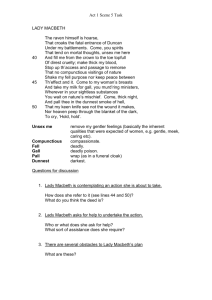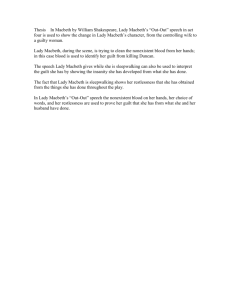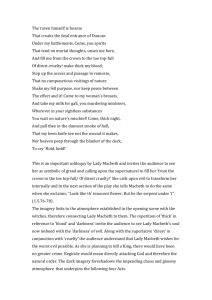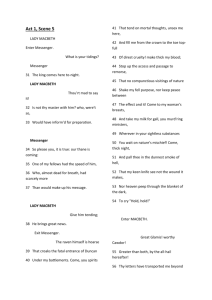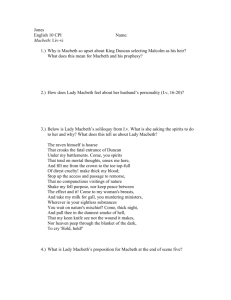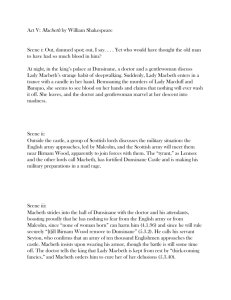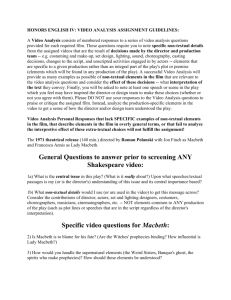ClaudiaTesssKelRelationship
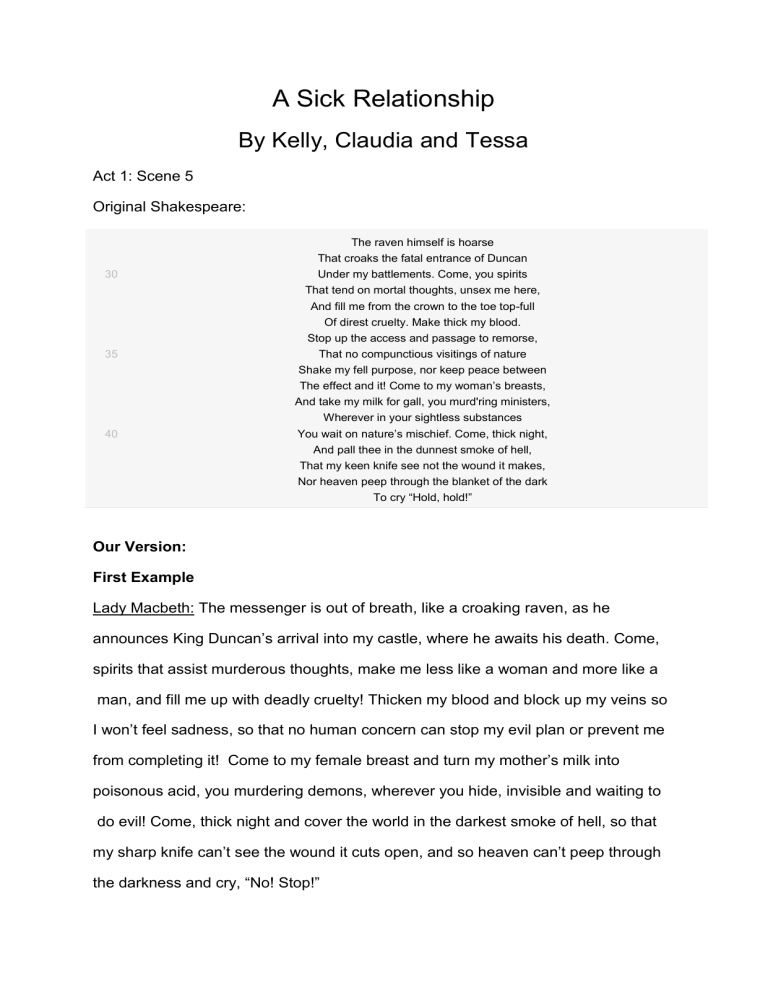
A Sick Relationship
By Kelly, Claudia and Tessa
Act 1: Scene 5
Original Shakespeare:
40
35
30
The raven himself is hoarse
That croaks the fatal entrance of Duncan
Under my battlements. Come, you spirits
That tend on mortal thoughts, unsex me here,
And fill me from the crown to the toe top-full
Of direst cruelty. Make thick my blood.
Stop up the access and passage to remorse,
That no compunctious visitings of nature
Shake my fell purpose, nor keep peace between
The effect and it! Come to my wom an’s breasts,
And take my milk for gall, you murd'ring ministers,
Wherever in your sightless substances
You wait on nature’s mischief. Come, thick night,
And pall thee in the dunnest smoke of hell,
That my keen knife see not the wound it makes,
Nor heaven peep through the blanket of the dark
To cry “Hold, hold!”
Our Version:
First Example
Lady Macbeth: The messenger is out of breath, like a croaking raven, as he announces King
Duncan’s arrival into my castle, where he awaits his death. Come, spirits that assist murderous thoughts, make me less like a woman and more like a
man, and fill me up with deadly cruelty! Thicken my blood and block up my veins so
I won’t feel sadness, so that no human concern can stop my evil plan or prevent me from completing it! Come to my female breast and turn my mother’s milk into poisonous acid, you murdering demons, wherever you hide, invisible and waiting to
do evil! Come, thick night and cover the world in the darkest smoke of hell, so that my sharp knife can’t see the wound it cuts open, and so heaven can’t peep through the darkness and cry, “No! Stop!”
Second Example:
45
50
LADY MACBETH
Who was it that thus cried? Why, worthy thane,
You do unbend your noble strength to think
So brainsickly of things. Go get some water,
And wash this filthy witness from your hand.
Why did you bring these daggers from the place?
They must lie there. Go carry them and smear
The sleepy grooms with blood.
MACBETH
I’ll go no more:
I am afraid to think what I have done;
Look on ’t again I dare not.
55
LADY MACBETH
Infirm of purpose!
Give me the daggers. The sleeping and the dead
Are but as pictures. 'Tis the eye of childhood
That fears a painted devil. If he do bleed,
I’ll gild the faces of the grooms withal,
For it must seem their guilt.
Lady Macbeth: Who said that? Why, my Lord, do you become weak when you think about things like this? Go, get some water and wash this evidence off your hands.
Why do you bring these daggers? Go and take them back, they have to stay there
Smear the blood on the sleeping guards faces.
Macbeth: I can’t go back and face what I’ve done. I don’t want to look.
Lady Macbeth: You coward! Pass the daggers to me. People who are dead or sleeping are no threat, only a child would be afraid. If there is enough blood on
Duncan I will cover the servants faces with it to frame them.
Summary: Even though Macbeth is the one who commits the crimes, Lady Macbeth is the driving force behind his actions and convinces him to commit the offences.
However, she eventually goes crazy and dies. But by that point, Macbeth has gone too far to turn back.
A note from Ja: Everything you say here is true, but you’d need more. You need to say that at the end of the play she dies. When the Lady dies, MacBeth’s ambition dies with her and he wakes up to become his true self. He realises the horror and evil of what he’s done, and that he now has no option but to accept the consequences. His only choice is whether to surrender and be mocked and possibly tortured before being executed, or whether to salvage some nobility by at least fighting bravely even though he has no chanc e of winning. So you’d probably want some analysis of the “Out damned spot” sleepwalking scene (Act V, sc I, lines 31 and following), then her subsequent death, including the possibility that she committed suicide (a mortal sin that would damn her to hell forever).
